Stressed out? Worn down? Fed up?
Why our modern lives are totally messed up & 5 things you can do about it. Hint: grow a garden.
I often say we live in strange times, but the other day I heard an analogy that really put this into perspective (credit to Tim Urban from the blog Wait But Why).
Imagine all of human history (let’s call that approximately 250 000 years) was written into a 1000 page book. So each page represents 250 years.
For the first 950 pages, NOTHING happens.
Well, that’s not entirely true. Plenty happens. We hunt, we gather, we have babies and raise them in small, tight knit communities. We live - if the anthropological studies are correct - largely egalitarian lives, with relatively few hours dedicated to work each day.
I’m not saying it was all sunshine and roses. I’d much rather have an infected finger in 2024 than 10 000 BCE. But there’s no denying that our lives were different. And they were like this for millennia. For 950 pages of our 1000 page book, this is how we lived, and, most importantly, it’s how we evolved to live.
Then suddenly, in some bizarre late-stage plot twist, we hit the last 50 pages and all of human civilisation happens. The last 2000 years are contained within the final EIGHT pages and when you get to page 1000, holy shit. All hell breaks loose.
Notes:
Today’s full newsletter is available to all subscribers - hope you like it!
It’s a list of ways that we can use our gardens to reconnect with nature in our strange and modern world
If you’d like to read it in full (and to access all of my member-only guides, newsletters, recipes and videos), you can upgrade your subscription by clicking the button below
Rapid technological advancements, modern medicine, the internet, artificial intelligence, cars, trains, planes, space ships, iPhones, atomic bombs, hermetically sealed apartment buildings, aircon, plastic, climate change, Uber, tinder, urban sprawl, Black Friday, cyber whenever the hell it is, and big mouth billy bass the singing fish. All contained on that final page. And most of them on the last 1/3rd of the final page.
When you actually look at the lives we live now, this analogy has a way of revealing just how farcical and ridiculous they are. You and I were born into this bizarre world, it’s all we know, so we don’t often stop to appreciate just how much of an aberration it is. We forget we are animals that evolved for millennia in very specific and relatively constant environmental conditions that have now been totally, absolutely, turned on their heads.
And we wonder why we’re anxious, melancholic, lonely, and addicted to our phones.
Well, I can’t say I have any real solutions, the wheels are off the proverbial cart and our whacky species is careening down the hillside. But I can say this: it is no surprise that those of us who grow gardens find them restorative, uplifting and addictive. They call to something deep within us. Something that we took for granted for 999 pages of the book of humanity.
Something we have now all but lost.
We can’t take the planes out of the sky, banish iPhones from the face of the world or stop the forward march of technological innovation. And probably we don’t really want to. But we CAN recognise the parts of our animal lives that are sliding rapidly from our collective consciousness, and make efforts to bring them back.
So today, here are 5 ways to rediscover what it means to be human, out in the sunshine, in the dirt, in your garden. Try them, even if they sound silly, you might be surprised by how they make you feel.
Garden without gloves or shoes
First I’ll cover my ass. Please be sensible and if you are pregnant/ immunocompromised/ allergic to dirt/ the owner of a cat who has toxoplasmosis etc etc, wear appropriate gloves/face coverings yadda yadda yadda.
But most of us are fairly robust most of the time, and as long as we’re not actively inhaling bags of potting mix, cow dung and lupin mulch, it’s pretty safe to garden without gloves or shoes. And, in my opinion, it is so much better.
For one thing, you’re so much less likely to go compacting your soil and crushing your seedlings by clomping on them with big boots. It’s also good for strengthening your foot muscles and improving your balance. We’ve only been walking on flat, homogenous surfaces for the last page of our book of humanity. We need the challenge of uneven and unpredictable surfaces to keep our balancing abilities strong, and it’s largely missing in today’s world.
Want to see how bad your balance is? Close your eyes and try to stand on one foot for at least fifteen seconds. This is a minimum we should all aim for, and it’s surprisingly hard. Garden without shoes and your feet will get a little glimpse of the sorts of textures and uneven surfaces that our ancestors were familiar with.
Gardening without gloves is, in my opinion, the only way to garden 99% of the time. I’ll wear gloves if I’m laying pavers, or spreading mulch and manure, but that’s pretty much it. And yet if you take a cursory glance online, you’ll find countless articles enumerating the dangers of gardening gloveless. The very first one I clicked on rattled off warnings of tetanus, sepsis and Legionnaires’ disease before stopping to draw breath. We people on page 1000 always do this. We fear nature, we find it dirty, unpredictable and unknown. We jump to mitigate the risks posed by the natural world, typically without asking what we may be losing in the process.
As it happens, coming into contact with certain beneficial bacteria in our gardens is now thought to have an antidepressant effect, causing the release of the feel-good neurochemical Serotonin. What’s more, the ABSENCE of adequate exposure to a wide range of bacteria, especially in childhood, has now been linked to increased susceptibility to asthma, allergies and various other diseases.
This doesn’t mean we should be trying to expose our kids unnecessarily to viral infectious diseases (many of which only evolved in the last 10 000 years anyway), but rather that living in hyper sanitised environments may be alienating us from certain bacteria that we have co-evolved with for millennia. Bacteria that we need to be exposed to, in order for our immune systems to develop properly. Certain of these bacteria (sometimes referred to as our ‘old friends’) can be found in our gardens.
Crush plants’ leaves and smell them
Aside from really good food, most of the smells we are exposed to in modern society are at best weird, and at worst gross or actively harmful. Air fresheners to mask the petrol fumes, fly spray, new carpets, perfumes that smell like sickening lollies, cigarette smoke, windex, toilet duck, cherry scented vape smoke, fresh paint, chlorinated pools. They’re all just so…intense. And the ones we’re supposed to like are usually pale simulacrums of things you find in nature. Find yourself a citrus flavoured cleaning product and take a good whiff. The go out and pick a lemon off the tree. Press your nail into the yellow skin until the oils bust out. Smell THAT.
Our gardens contain so many fantastic fragrances, but we often forget to enjoy them as regularly as we could. Pick more of your flowers and bring them inside. Grow star jasmine, or pink jasmine, sweet peas, stocks, roses and jonquils. Pick citrus blossoms and let them float in a little bowl of water on your dining table. Crush a rose scented pelargonium or a lemon verbena between your fingers. Smell the grass. We spend so much of our money and time pursuing sensory, hedonic pleasures, and these are out there every day, in our gardens, for free. And I guarantee that a bathroom with a vase full of jonquils will do more for your happiness than one throbbing with the bright blue notes of toilet duck.
Actually look at the plants you’re growing
Our ancestors were pros at plant recognition. And we have the same evolved capacity to notice and identify a vast array of plants, but we rarely use it.
The thing is, it’s surprisingly easy to spend a lot of time growing a garden and to forget to actually LOOK at your plants. I know this because I do it too, and I have to work to remind myself not to. To remind myself to stop and really look. Up close, when you’re not rushing, plants are incredible. All of them, even the ones you think are weeds. Nasturtiums have these little frilly feathered parts that only occur on half of their petals, near the centre. The petals without feathery bits are striped and more ornamental. It’s the plants’ mechanism for attracting bees and directing them to the pollen-filled centre. And it’s gorgeous.
I 100% guarantee you that there is so much more interest, complexity and beauty to your garden, whatever stage it is at, than you typically notice. Because, I don’t spend nearly enough time noticing it in my garden either. But when I sneak away from the hyper-stimulating siren calls of my various devices, and just look - quietly - at a flower, I am reminded, without fail, that there is a whole world of beauty and complexity waiting to inspire me with awe, if only I’ll remember to visit it more often.
Eat your veggies straight off the plant
I’ll be the first to admit that taking an aesthetically pleasing basket outside, filling it with an array of homegrown produce, taking a photo of it and posting it online feels pretty good. But you know what else feels good? Doing absolutely none of that bullshit and just eating what you’ve picked, right there, in the garden.
When I was a kid my parents grew cherry trees at their farm. And in the summer I’d wake up, go outside, climb into the arms of a cherry tree and just sit there, eating cherries and spitting out the pips. I didn’t need to take a photo of that experience because it is etched into my memory as one that is forever golden and perfect. Now our little boy doesn’t give me time to photograph anything because, in his infinite wisdom, he knows that the right way to eat a broad bean is instantly, the moment the pod snaps off into your hand.
It’s not just that it tastes better, I think it changes the way we view our gardens. Not as places to provide us with some mighty haul, but as places to go to experience actually living symbiotically with plants. It just feels different, in a way I find hard to put into words. Try it and let me know if you agree.
Crawl into you garden, hide under the plants
Last one, and if you’ve tried the other four suggestions promise you’ll try this one too. Spend more time in your garden beds. Not working in your garden beds, literally IN your garden beds. Find your biggest, shrubbiest plants and crawl under them. Let them shroud you, shade you, envelop you. You’ll feel like a little kid playing hide and seek. You’ll notice how the sun filters through the green leaves. You might see tiny spiders, or a path of ants wending its way back to the nest. Find a spot where you are truly hidden, where no one can find you or see you or tell you that work called and they’re wondering if you got the latest contract email because it needs signing before COB.
SCREW THAT. Yes there is a lot of good stuff about living on page 1000. But if you are feeling stressed, overworked, overwrought or otherwise weary, consider the possibility that maybe that is actually a totally normal, totally healthy response to living in very strange times.
Almost none of what we do every single day is what our bodies and minds have evolved to do. It’s all so very recent, so very strange.
There’s more I could have added to this list - save seeds from your plants, crush them over the bare earth and see what grows. Lie on your back in the sunshine and stare at the clouds. Listen to the insects at night. Watch for shooting stars. Light a fire and grill homegrown zucchinis above the flames. Watch the coals burn down. It’s easy to get disoriented, but there are so many ways, once we start looking, to find a path back to ourselves.
The trick, I think, is to always be looking.
Thank you for reading! See you next time for more Lo fi life!
P.S. If you are enjoying my newsletter and know someone else who might like it too, hit the button below to send them a referral. Readers who refer 3 friends will receive a bonus 1 month’s subscription to Lo fi life for free!





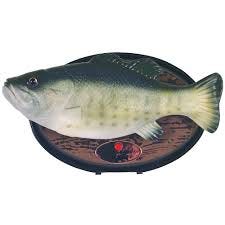
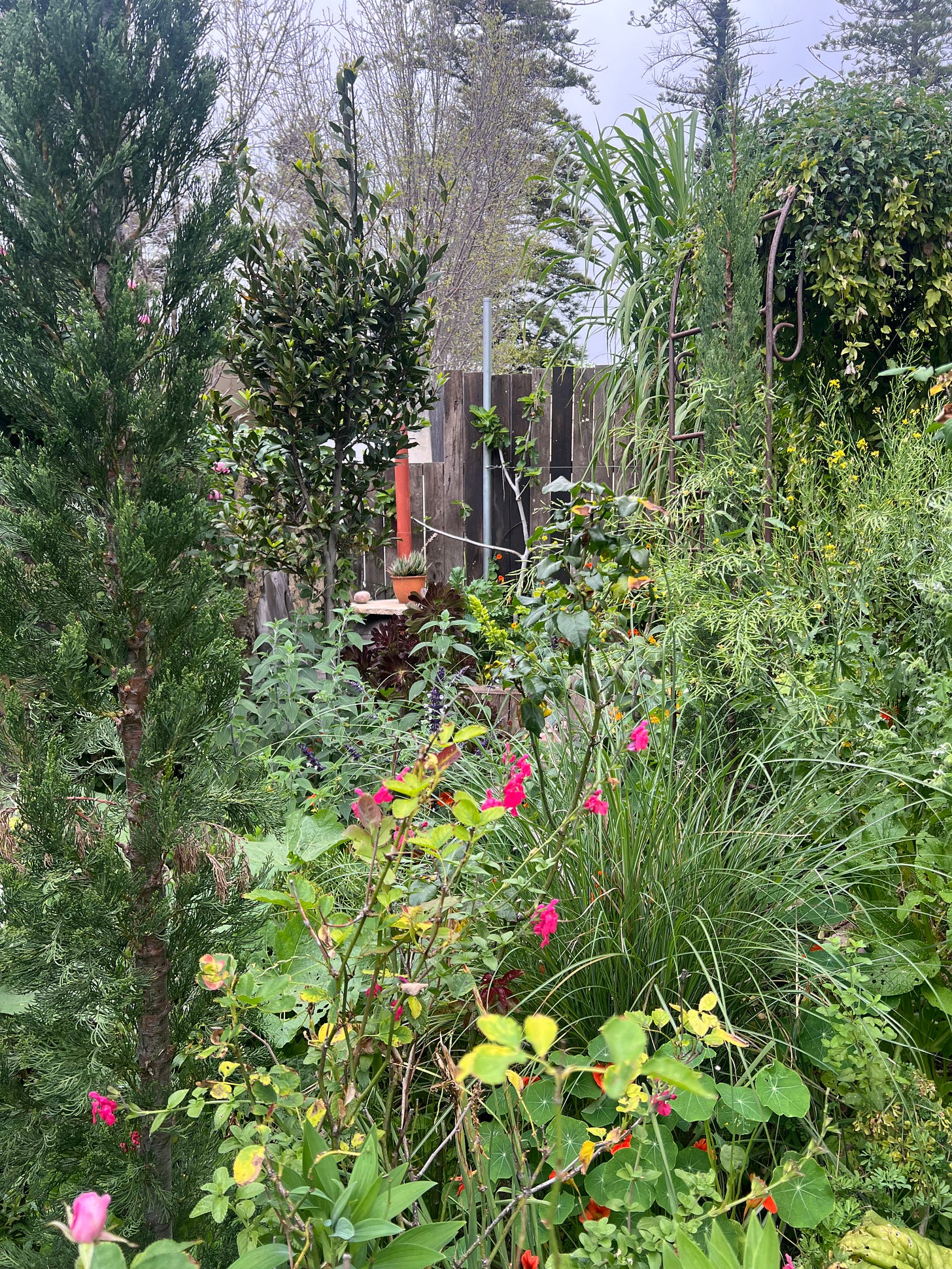
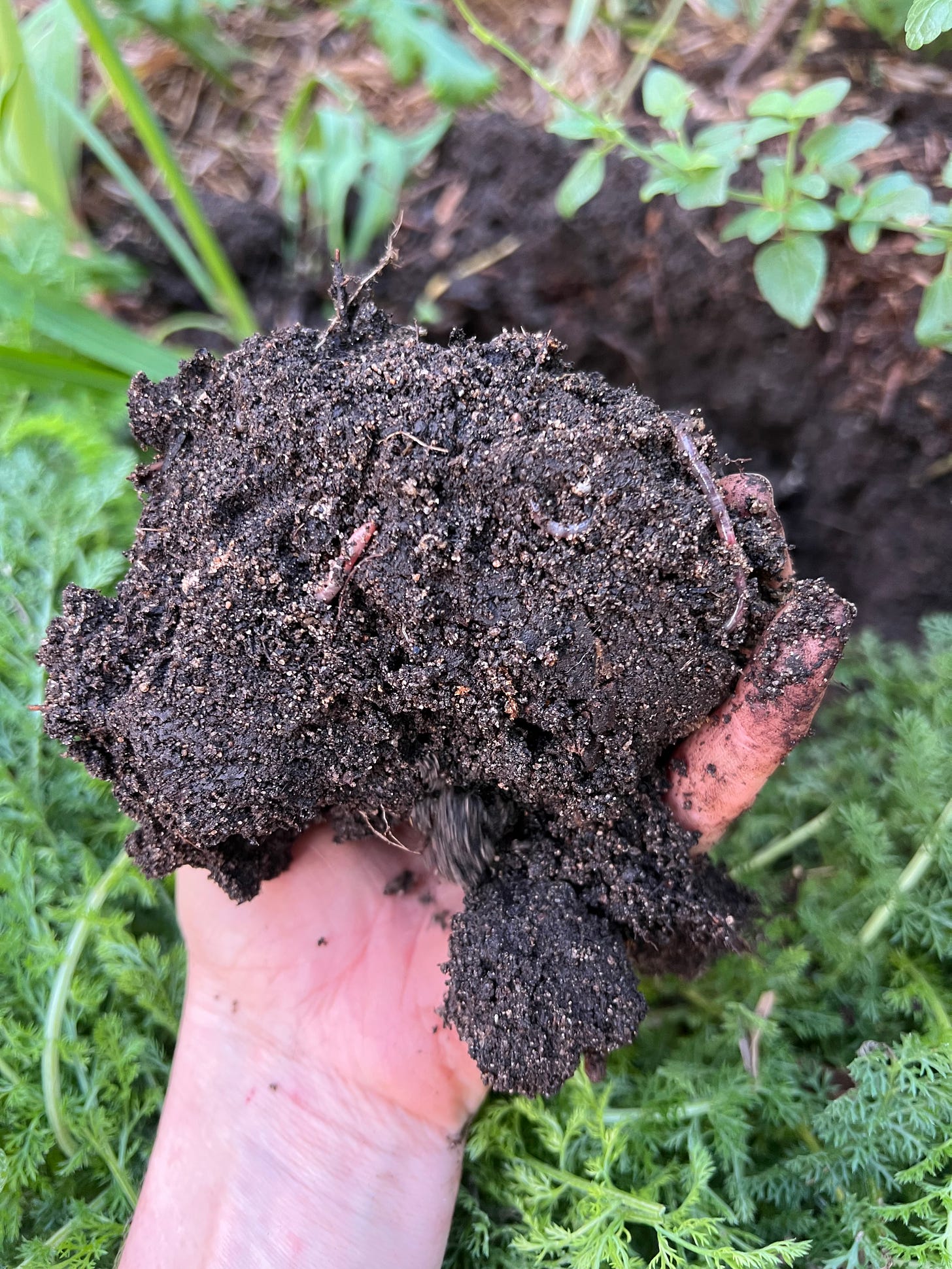
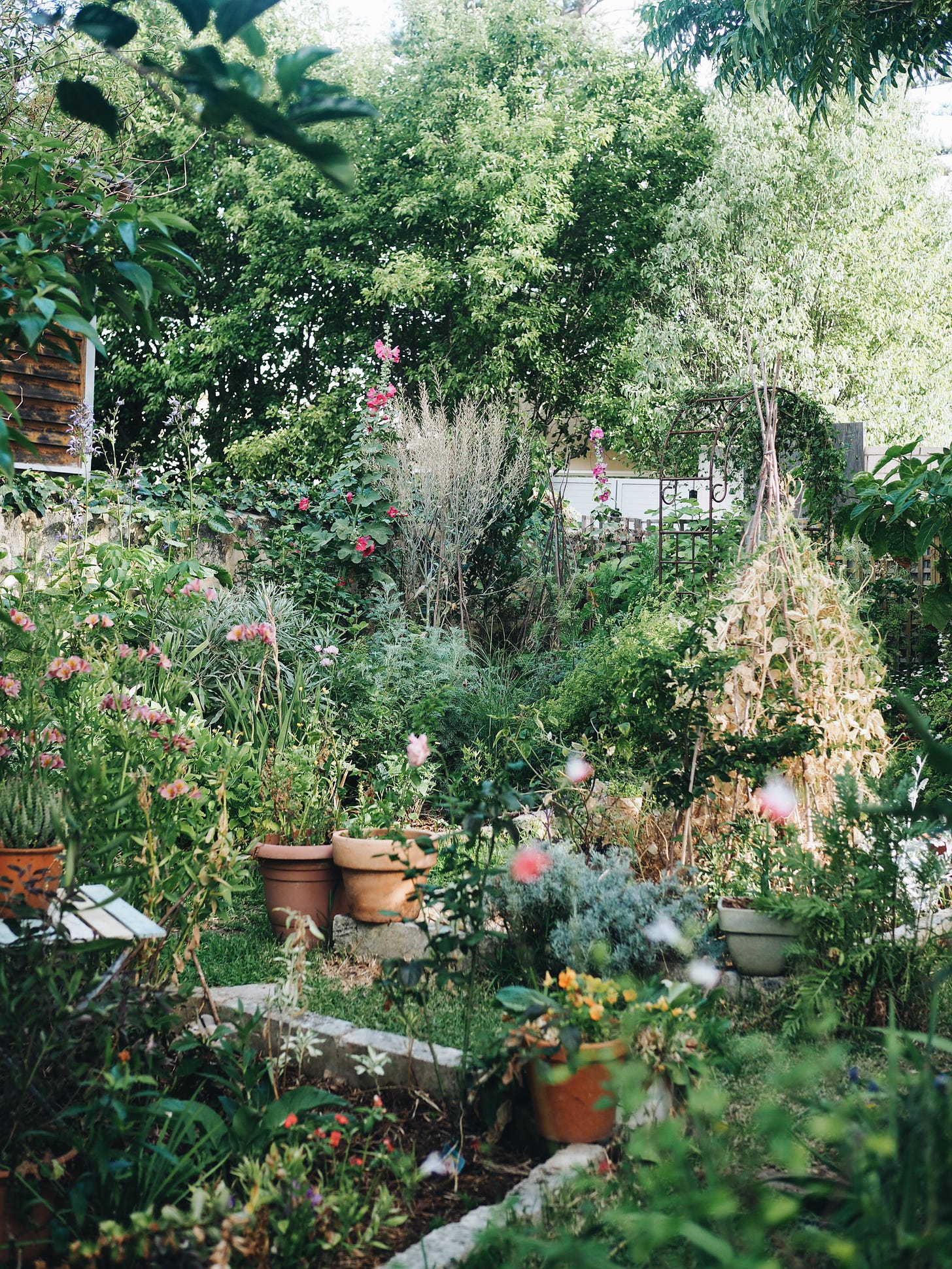
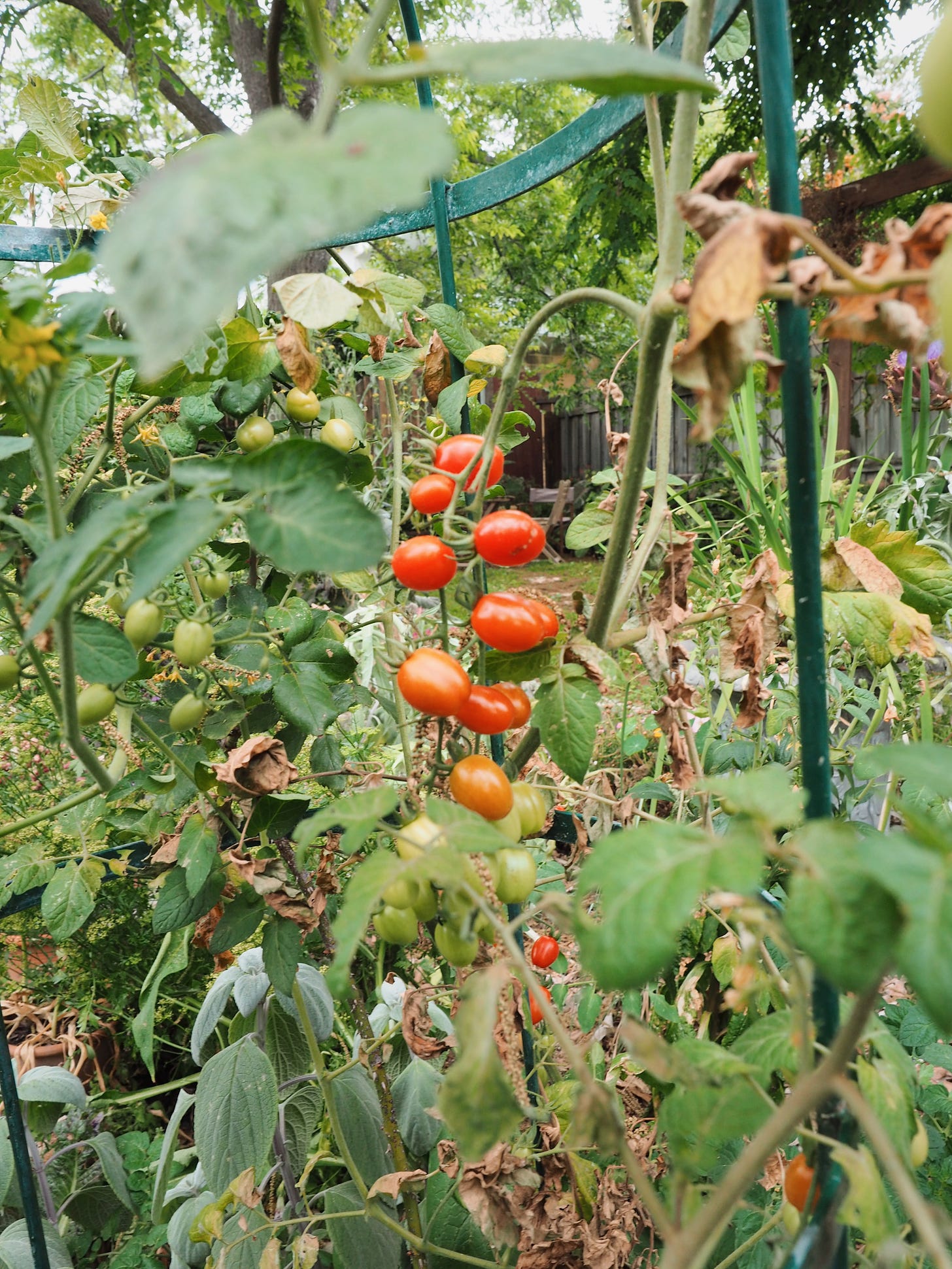
Brilliant!
I love this!
Casey you are right on the knocker here with spending time in the garden. And not just running through thinking, 'oh, I should trim that tree, those weeds need pulling out, which animal pooped there?' but actually just 'being' in a garden.
My little herb & veggie gardens are giving me such delight. I talk to the little tomato plants - I have six little green tomato nubs coming now - and thank the coriander for its bounty, given way now to little white flowers that the bees just adore. I put my old cast iron two seater and little table right underneath a tree (no idea what kind of tree it is, it doesn't matter) and huddled next to a presently-flowering bush. To sit there and watch the bees bumble around, see the birds take turn in splashing around in the bird bath, to listen to the warming breeze rustle the leaves, and feel that dappled sunlight on my face as I sip a cup of Earl Grey - I tell you, it's one of the highlights of my day if I can do that.
That and looking up into the night sky. Seeing the perfect half-round moon, the twinkly stars, the roaming satellites, the special shadowed hush of a passing owl.
Nature is where we were created to exist, not this noisy, plastic, toxic thing we live in.
Everyone needs to read your post and try at least one of the five ways to rediscover nature.
Thank you!
Awesome as fuck advice 🌻💕I love it 😊